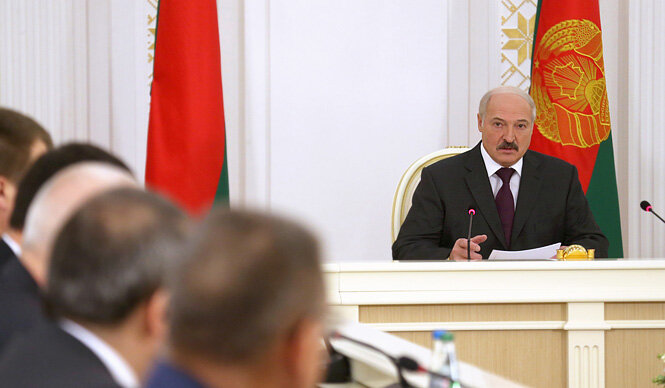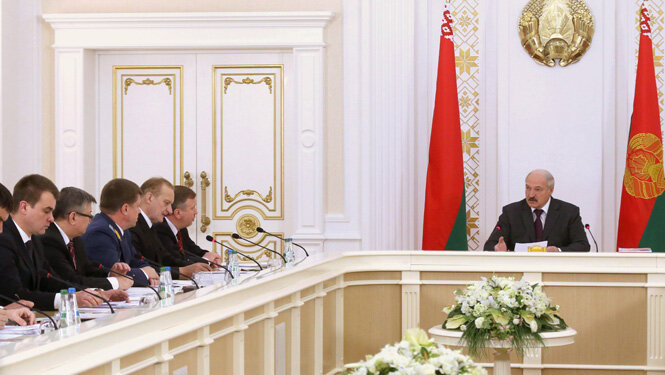Meeting to discuss draft agreement on EEU Customs Code
- 1
We need to protect Belarus’ national interests as the Customs Code of the Eurasian Economic Union (EEU) is adopted, President Aleksandr Lukashenko said during the meeting on the draft agreement on the EEU Customs Code on 9 December.
“This document should be thoroughly elaborated, so that not a single Belarusian citizen, including me, asks our government, which has been responsible for the drafting and consideration of the Code, what real results it has brought about and why the situation in some aspects has become worse than before. Whatever compromise the Code carries (I do not rule out that compromises are possible in certain aspects), but we can by no means let the social and economic situation in Belarus become worse,” the Belarusian leader stressed.
“Everything should be properly considered and coordinated with ministries, agencies, and regional executive committees. And also district executive committees, if necessary. It is necessary to involve all specialists, even those with opposing points of view, and communicate the provisions of the document to them, to the citizens of our country. This should be done immediately in order to give people time to provide feedback and say what is beneficial for us and what is not,” the President said.
The relevant document, according to the President, is expected to be signed at the session of the Supreme Eurasian Economic Council in Saint Petersburg on 26 December. Aleksandr Lukashenko noted that before he makes a decision, Belarus would like to hear the views of the authorized officials and especially those who will put their signatures on the draft treaty. “These are all members of government and senior officials,” he said.
“Everyone who will be working with the document will be held accountable for any decisions that will lead to any shortcomings. Everyone bears personal responsibility,” Aleksandr Lukashenko stressed.
Speaking about the Customs Code, the Belarusian head of state underlined that everything should be taken into account in the course of its adoption. “We must not lose anything. We have nothing to yield. While the main players of our economic union — Russia and Kazakhstan — can forfeit something (they have a lot of money, you know from what sources), Belarus has no spare money like that. We earn our money with our brains and hands,” added Aleksandr Lukashenko.

Aleksandr Lukashenko remarked that from the point of view of customs procedures and the customs process Belarus is totally transparent. “Everything is totally obvious, nothing can be hidden here. Even automobiles cannot be imported without paying import duties. Truth will out,” he said.
At the same time the President stated that, for instance, Kazakhstan and Russia have huge territories and long borders. It can be hard to stay on top of every process considering these factors.
Aleksandr Lukashenko said: “Even if everything is okay, people like Dankvert and the rest will spit, lie about and berate just like they did a short while ago. It turns out he cannot eat a piece of meat from Belarus, or a glass of milk, or a loaf of bread because the foods are not of the right kind. Meanwhile, the Belarusian government remains silent about it.”
Aleksandr Lukashenko pointed out that with the economic opportunities that are opening up for Belarus, the country lives in a context of the stiff global competitive environment, and has to address the arising challenges and threats. “This is why the adoption of the Customs Code is a very important stage in the development of integration processes. It is necessary to ensure that Belarus’ national interests are protected,” the President stressed.
Aleksandr Lukashenko recalled that in November he instructed the Belarus President Administration and the State Control Committee to review the draft of the new Customs Code together with experts and scientists and make conclusions.
He asked whether the new Code takes into account the previous integration agreements and the changes in the geopolitical situation and Belarus’ key EEU partners. “And, most importantly, does it take into account the previous mistakes that are unacceptable for us, first of all, from the standpoint of economy?” the head of state wondered.
Aleksandr Lukashenko requested a report on the potential contribution of the Customs Code to the development of the investment climate, improvement of Belarus’ transit appeal, protection of Belarusian manufacturers, and the economic security of the country. “After all, will we be able to make decisions on these economic issues in Belarus? Or the decisions will be taken by someone else for us?” the head of state asked.
Aleksandr Lukashenko wondered whether it is too early to delegate the decision-making on customs regulations from the national level to the supranational one.
“The government reports that in the result of the negotiation process, for the first time Belarus has managed to convince the EEU member states to accept our idea to gradually reduce the quotas for duty-free import of goods by individuals. However, I have been informed that the draft Customs Code does not formalize this agreement. So I have a question: what is the guarantee that the parties will observe the reached agreements and will not change their position once the document is signed?” Aleksandr Lukashenko said.
The head of state also asked about the benefits that Belarus is getting from EEU’s import customs duties in the light of the recent changes. He gave instructions to once again review the provisions of the new Customs Code in the time remaining before the top-level meeting to find out how much they reflect Belarus’ national interests.

